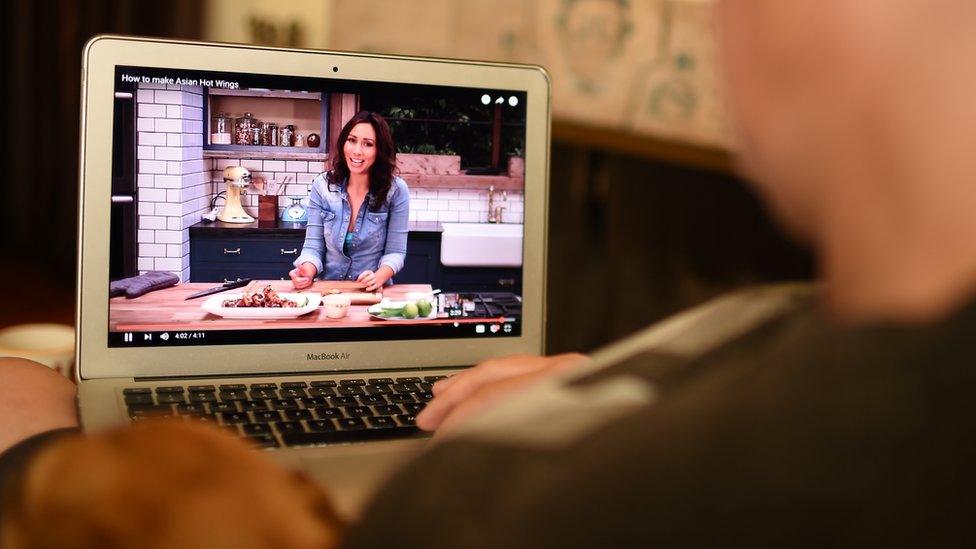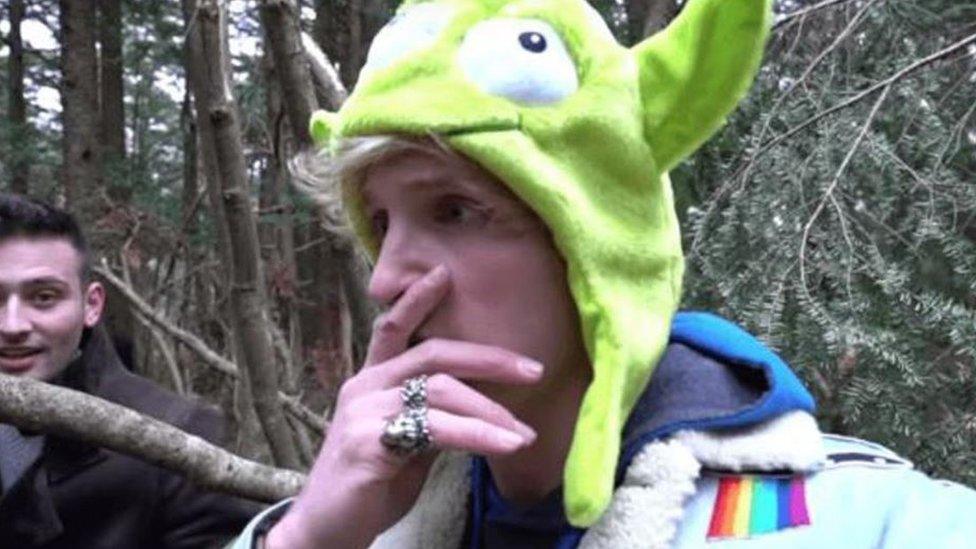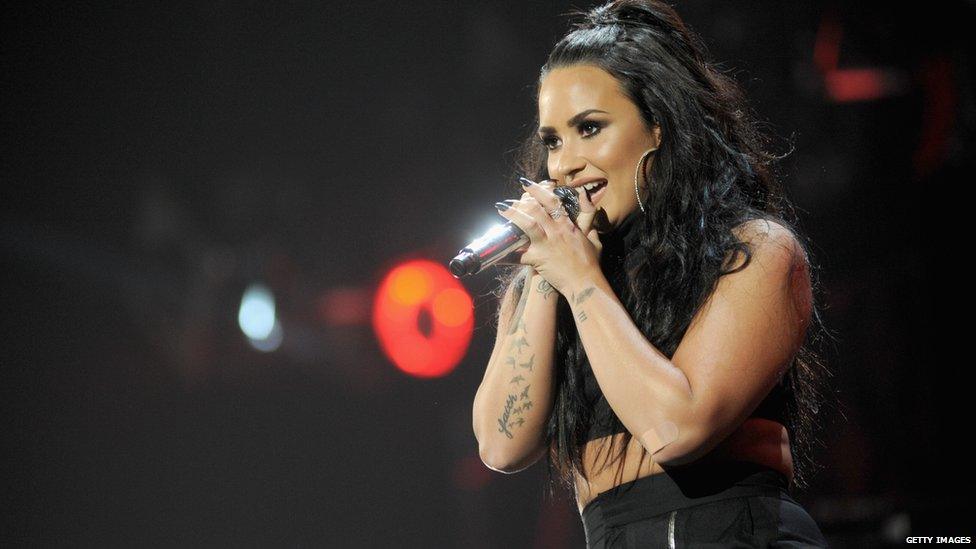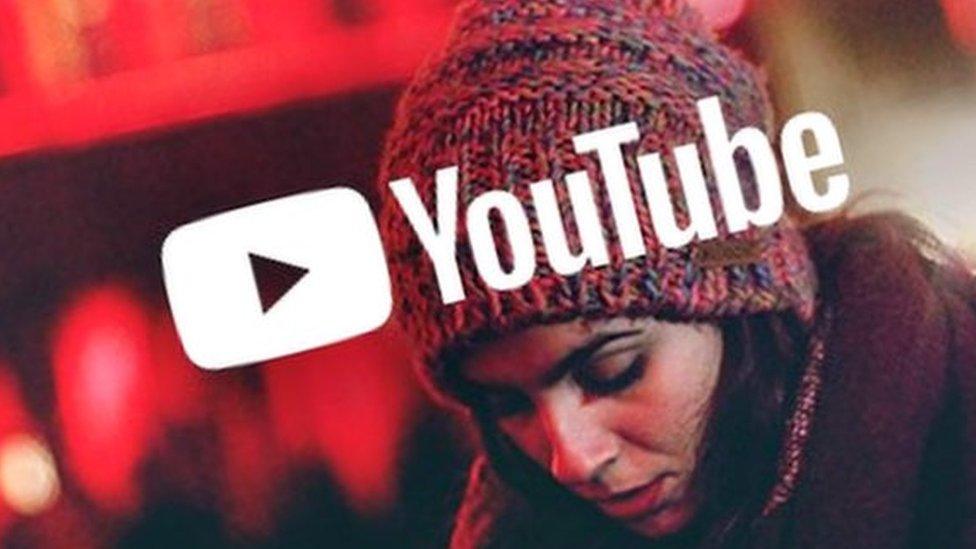After Logan Paul scandal, YouTube says it shouldn't be regulated like TV
- Published

YouTube has denied its content should be regulated in a way similar to traditional broadcasters.
Speaking to Newsbeat, the platform's chief business officer says the site is "different" and doesn't have the same "editorial hand" broadcasters have.
The Google-owned company is about to launch its first original UK-based production on its ad-supported platform, fronted by Jack Whitehall.
It will be produced by James Corden and the team behind his US talk show.
YouTube's Robert Kyncl has insisted in a rare interview: "We're not content creators; we're a platform that distributes the content".
There were calls for YouTube to be regulated after a vlog by Logan Paul - one of its biggest stars - showed the body of a man who appeared to have killed himself.

A screengrab from the video posted by Logan Paul in Japan's Aokigahara forest
The upload broke YouTube's community guidelines and the company says it's putting in measures to ensure a video like that is never uploaded again.
In the UK, licensed broadcasters have to stick to rules set by the regulator Ofcom, external, but YouTube insists it's an open platform.
"It doesn't absolve us of responsibility, we actually take that very seriously," Kyncl says.
The site's community guidelines act as the "standards which are a guide on how to behave on YouTube," he adds.
He also says YouTube's committed to hiring "up to 10,000" more people to monitor controversial content - and insists the site is "constantly evolving" to cope with new problems.
"The steps we're taking are not steps any government is asking us to do, these are the steps we're choosing to do because we believe that is the right thing to do."
Robert Kyncl admits monitoring an open site is "one of the hardest things you can do" but says it's worth doing properly "because openness brings so many great benefits".
Original programming on the site - like the new comedy Training Days, focusing on what famous footballers get up to when they train - is going to increase.

Demi Lovato's documentary Simply Complicated was broadcast on YouTube in 2017
Last year it broadcast Demi Lovato's documentary Simply Complicated, as well as Katy Perry's Witness Worldwide, a Big Brother-style four-day exclusive stream.
Kyncl says it's using shows like that to "drive more interest to YouTube to benefit content creators."
Working with James Corden and his team is no surprise after the success his Late Late Show's Carpool Karaoke feature has had on YouTube.
The segment with Adele has had more than 175m views.
(Warning: Third party videos may contain adverts)
Its success "surprised everybody" admits Kyncl, who says: "James is incredibly thoughtful to make sure his show works both on TV and on YouTube".
In 2016, Apple Music bought the rights to a Carpool Karaoke spin-off that YouTube had turned down.
"We figured we already have Carpool Karaoke so we don't need another one," Kyncl explains.
"It would be pretty hard to beat the one we already have. It didn't make sense for us - but it made sense for Apple."
Last year was "difficult", the company wrote in a blog post, external.
There were issues with some of its biggest creators - not just with Logan Paul - but others like PewDiePie who was accused of using "a racial slur".

Investigations also revealed that ads for big brands were being regularly shown on racist videos or those that encouraged violence.
Brands boycotted the site and pulled sponsorship.
YouTube then announced it was going to make it harder to make money from vlogs.
Clips will no longer have adverts attached unless the publisher meets two criteria - that they have:
at least 1,000 subscribers
more than 4,000 hours of their content viewed by others within the past 12 months
Some vloggers criticised the announcement, believing it punishes smaller channels.
It's one of the steps YouTube is taking to regulate itself - by continuing to change its guidelines as the platform grows.
But Kyncl explains to Newsbeat: "If you're really serious about it - you will continue."
He says it's an "important step" that will help tackle abuse as when YouTube shuts down a channel for abuse, a new one could be created instantly - and monetised.
"We're protecting the advertiser and we're protecting creators earning a living on YouTube," he says.
"We have to make sure we protect both and this gives us the time to do that."
Find us on Instagram at BBCNewsbeat, external and follow us on Snapchat, search for bbc_newsbeat, external